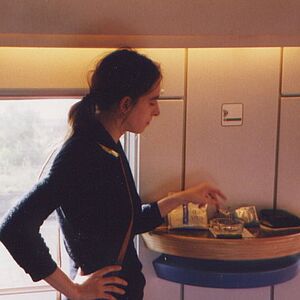
Liesbeth De Mol
Présentation
What is a computation? This has been the main question behind most of my research. Its general motivation is rooted in the conviction that in order to understand modern technique a fundamental reflection on the dominant techniques of our times – computation and its physical incarnation the computer – is much needed. For me, such reflection entails going against the dogma of the GUI (Graphical User Interface) – Google, Windows, Apple etc – which hides the machine and its formal representation(s) and control(s) – and thus a commitment also to the technical details that lie beneath the surface. My own research on this question developed slowly out of my first programming experiences during the first year of my PhD – which was initially focused on the use of visualisations in mathematics and logic – together with my close reading of the works of Emil Post, Alan Turing, Alonzo Church and Kurt Gödel as well as my reading of Stephen Wolfram's book A new kind of science. I was puzzled and fascinated by the apparently twofold historically developed « nature » of computation, first as a theoretical concept needed to prove impossibility results in mathematics and, second, as a practical notion developed within practices of computing machinery (programming, computing machines, manual computation, etc). I became more and more convinced of the multidiscplinary nature of « computation » as it developed in the 20th century and thus also of the methodological requirement to study computation, its history and philosophy, from multiple perspectives in order to grasp and clarify the confrontations, tensions and interactions between theories and practices of computation.
In my own research this conviction shows itself in the fact that I have studied different aspects of the history and philosophy of computing applying different methodologies (computer experiments, reconstructions, micro-analyses, etc) and engaging with the details of practices of programming, mathematics and logic. More particularly, I have focused on the following, interrelated, topics of research: practices of programming (this includes, amongst others, my research on ENIAC, one of the first computers); interactions between computing and mathematics (this includes mostly research on the impact of the computer on mathematics) and interactions between logic and computing (this includes, amongst others, my ongoing research on the works of Emil Post but also the general question of the relation between logic and computing).
On a broader scale, together with several other researchers, I became involved with establishing an interdisciplinary community of people working or interested in the history and philosophy of computing. This resulted in the foundation of the DHST/DLMPS Commission for the History and Philosophy of Computing (www.hapoc.org). Whereas the work of the commission is mostly focused on providing a platform for reflections on historical and philosophical aspects of computing, the ANR research project PROGRAMme, of which I am the PI aims at real collaboration across different backgrounds((https://programme.hypotheses.org/).



